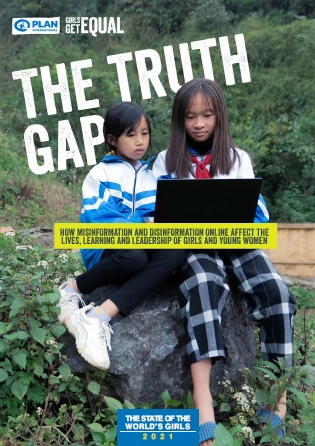Will you support young peoples’ call for action?
Everyday we see lies and stereotypes about who we are and how we should behave. Videos and images are manipulated to shame us. There are fake facts about the COVID vaccine. And we watch as women leaders – our role models – are undermined with rumours and conspiracy theories.
False information makes us doubt our worth. It harms our mental health. It affects our trust in politics. And most of all? It stops us reaching our potential.
This problem is increasing every day, especially as the pandemic moves our lives online.
Right now? We’re left to deal with it on our own.
Since 2020, Plan International Australia has been working with young people around the world to push our governments to educate us – and all children – in digital literacy. Girls need to be able to tell what’s true from what’s false. And all young people need to be able to question information and check facts before they share it. This is a vital step.
Maria, 17, Bolivia; Kumkum, 16, India; Nuria, 18, Peru; Sandra, 16, US; Neha, 19, Nepal; Dedeou, 21, Mali; Ronja, 21, Finland; Madjidath, 22, Benin; Gradi, 20, Malawi
What did the research find?
- Exposure to lies and false information online left one in three of the girls and young women we spoke to feeling stressed, worried or anxious. One in five was left feeling physically unsafe.
- Girls are watching women leaders targeted with malicious rumours and conspiracy theories designed to attack their credibility and shame them into silence. This damages girls’ leadership ambitions.
- One in four feel less confident to share their views. One in five (18%) stopped engaging in politics or current affairs. And for one in five it’s knocked their trust in election results.v It is corrosive, undermining girls’ and young women’s confidence to take part in public life.
- False information can cost lives. More than half of the girls and young women we spoke to regularly engage with information about COVID-19 online. But a quarter of those surveyed believed a myth or ‘fake fact’ about COVID-19, and one in four have questioned whether to get the vaccine.
- Girls and young women from low and middle-income countries are more likely to be affected by misinformation and disinformation online: They are more likely to have believed a myth about COVID-19 and are twice as likely to have questioned whether to get the vaccine.
- The spread of false information online has real life consequences. It is dangerous, it affects girls’ mental health, and it’s yet another thing holding them back.
- The risk is growing. The COVID-19 pandemic has had a huge impact on all our lives, and girls are more reliant than ever on digital platforms. And more girls are getting access to the internet globally every year.
Girls and young women care about this and they want to see action. We are raising girls’ voices and joining organisations that have been speaking up for years.
Right now, girls don’t know what to believe, who to trust and where to find the truth.And adults aren’t talking to them about it. Girls told us they’re left to manage on their own. Some perpetrators are out to abuse, deceive and manipulate girls on purpose. But the relentless mass of false information online is shared by accident. Exaggerated claims are made to grab attention and get clicks. Lies spread further and faster, from peer to peer.
Girls want the skills to navigate false information online. And they want all children to be taught digital literacy skills to prevent the spread. We need to equip girls – and all children – for an increasingly digital world.
Stop the Spread of False Information Online
- Mia, Kenya
- Lilly, Malawi
- Nabila, Germany
- Maya, Indonesia

The Research
Girls and young women spend huge amounts of time online. Access to the internet, where the gender gap remains very much an issue, is crucial in today’s digital world. So, too, are the navigation skills to make the most of all the internet has to offer.
This research clearly illustrates the benefits of the online sources and social media platforms which girls and young women use: they can connect to like-minded people all over the world, find information about topics taboo in their homes and communities and gain support for their activism. There is a downside to this.
They are also exposed to a whole world of false information, misogyny and stereotyping. It can mean wading through half-truths, prejudice and downright lies, to unearth the undoubtedly useful and truthful factual information and interesting opinions.
False information affects everyone, but there are specific consequences for girls and young women. Gender inequality effects every aspect of their lives and false information online further silences them, limiting their ambition and their ability to learn about the issues that interest them.
Misinformation and disinformation online is a human rights issue: affecting girls’
rights to participation, to education and to freedom of expression. As girls and young women struggle to disentangle truth from fiction, facts from propaganda, their trust in all sources of information — governments, academics, journalists, community leaders — is undermined.
We all need to be aware of this, to understand the specific effects of online misinformation and disinformation on girls and young women so we can tailor solutions to meet their needs.
